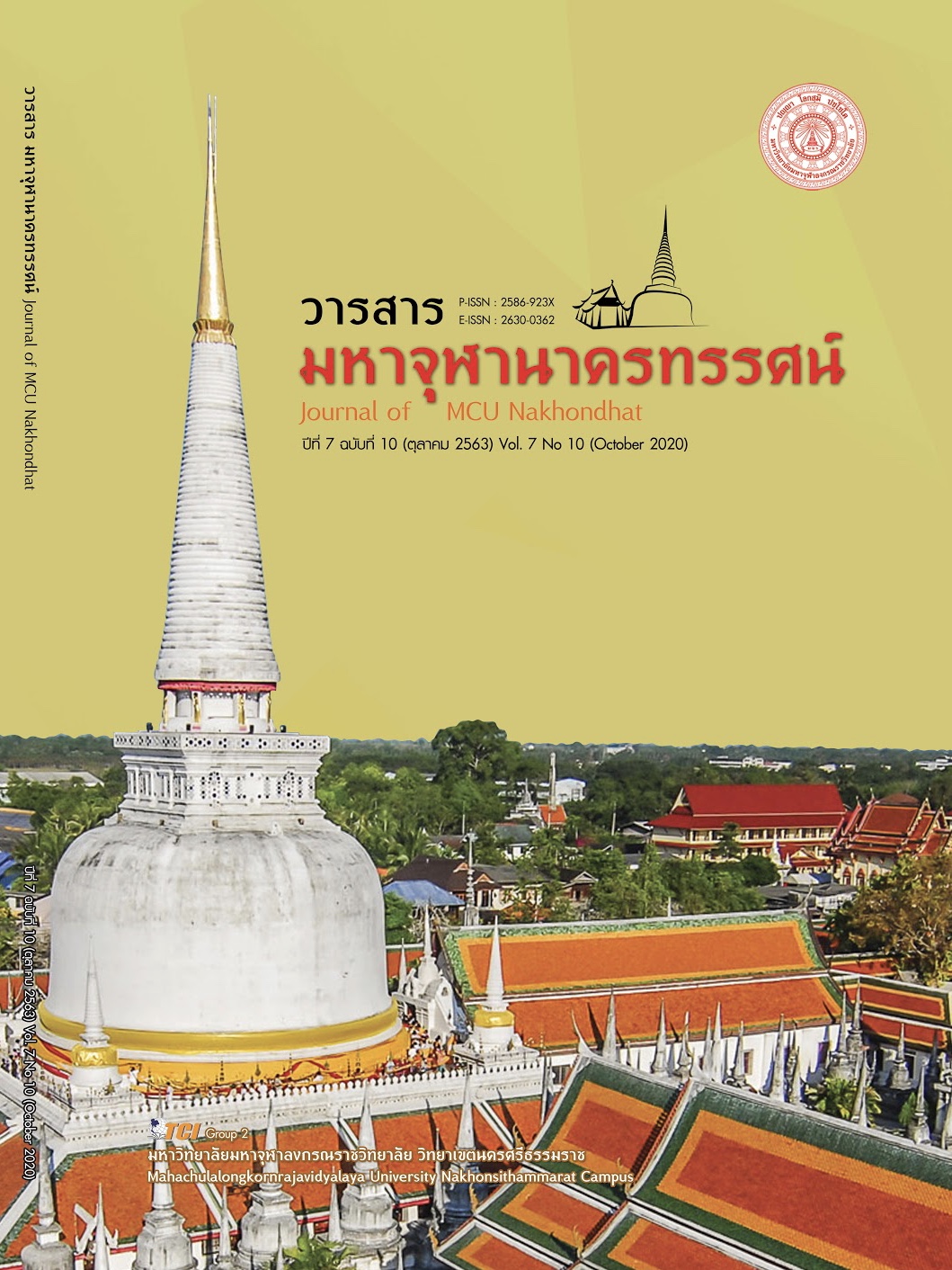THE KALYANAMITTA WITH THE DEVELOPMENT OF THE QUALITY OF LIFE IN ACCORDING TO BUDDHISM
Main Article Content
Abstract
The Objectives of this research article were to Buddhism are 1. To study the principles of the Kalyanamitta in Theravada Buddhism 2. To study the development of the quality of life in accordance with the Buddhist 3.To study the Kalyanamitta for the development of quality of life in accordance with Buddhism which a documentary data to the summarized as follows: The results of research follows as: The principles of the Kalyanamitta in Theravada Buddhism. The Kalyanamitta in Singalasutta means true and false friends. The development of the quality of life in accordance with the Buddhist aims 1) Aim for the benefit in the world of sense - desire (Kamaloka) for created stability make it a non - negligent way of life and make a good model for others 2) Aim for the benefit in the world of form (Rupaloka) for developing has a dharma as the controlling faculty (Indriya 5) are the confidence (Saddha), effort (Viriya), mindfulness (Sati), concentration (Samadhi) and wisdom (Panna) 3) Aim for the benefit in the formless world (Arupaloka) is a destruction of sensuality in which humans can develop themselves to the point of destroying sensuality with methods of self - development to have strong minds. The Kalyanamitta for the development of quality of life in accordance with Buddhism has divided as follows: 1) About diary life; with consult to be a diligent and do not ignore any tasks, 2) About society; help each other and do not be a trouble for community and the relevance. 3) About morality; advise the dhamma are faith, effort, mindfulness, mediation and wisdom there are the practice principle for disengagement and 4) About education; the virtuous will advise good things for achievement. In worldly is mean progress in worlds and also advice the benefits for this life and next life till nirvana
Article Details
References
พระกิตติศักดิ์ ยโสธโร (แก้วเหลา). (2539). การศึกษาบทบาทของพระสารีบุตรเถระในการ เผยแผ่ พระพุทธศาสนา. ใน วิทยานิพนธ์พุทธศาสตรมหาบัณฑิต สาขาวิชาพระพุทธศาสนา. มหาวิทยาลัยมหาจุฬาลงกรณราชวิทยาลัย.
พระธรรมปิฎก (ป.อ. ปยุตฺโต). (2543). พุทธธรรมฉบับปรับปรุง. กรุงเทพมหานคร: มหาจุฬาลงกรณราชวิทยาลัย.
พระพรหมคุณาภรณ์ (ป.อ. ปยุตฺโต). (2551). พจนานุกรมพุทธศาสน์ ฉบับประมวลศัพท์. กรุงเทพมหานคร: บริษัท เอส อาร์ พริ้นดิ้ง แมส โปรดักส์ จำกัด.
พระมหาทองพูล สติสมฺปนฺโน (เสือเขียว). (2547). การคบมิตรในพระพุทธศาสนา. ใน วิทยานิพนธ์พุทธศาสตรมหาบัณฑิต สาขาวิชาพระพุทธศาสนา. มหาวิทยาลัยมหาจุฬาลงกรณราชวิทยาลัย.
พระมหารัศมี ชุติโก (ด้วงได้). (2547). ศึกษาเปรียบเทียบมิตรภาพในพุทธปรัชญาเถรวาทกับ อริสโตเติล. ใน วิทยานิพนธ์พุทธศาสตรมหาบัณฑิต สาขาวิชาปรัชญา. มหาวิทยาลัยมหาจุฬาลงกรณราชวิทยาลัย.
พระมหารุ่ง ปญฺญาวุฑฺโฒ(แรกชํานาญ). (2547). การศึกษาเชิงวิเคราะห์สถานภาพคุณสมบัติและบทบาทของพระ โสดาบันในพระพุทธศาสนาเถรวาท. ใน วิทยานิพนธ์พุทธศาสตรมหาบัณฑิต สาขาวิชาพระพุทธศาสนา. มหาวิทยาลัยมหาจุฬาลงกรณราชวิทยาลัย.
มหาจุฬาลงกรณราชวิทยาลัย. (2539). พระไตรปิฎกภาษาไทย ฉบับมหาจุฬาลงกรณราชวิทยาลัย. กรุงเทพมหานคร: โรงพิมพ์มหาจุฬาลงกรณราชวิทยาลัย.
วิไลรัตน์ พฤกษาภิรมย์. (2547). ความเป็นกัลยาณมิตรของผู้ประเมิน ภายนอกตามความคิดเห็นของผู้บริหารสถานศึกษา สังกัดกรุงเทพมหานคร. ใน วิทยานิพนธ์พุทธศาสตรมหาบัณฑิต สาขาวิชาพระพุทธศาสนา. มหาวิทยาลัยมหาจุฬาลงกรณราชวิทยาลัย.


